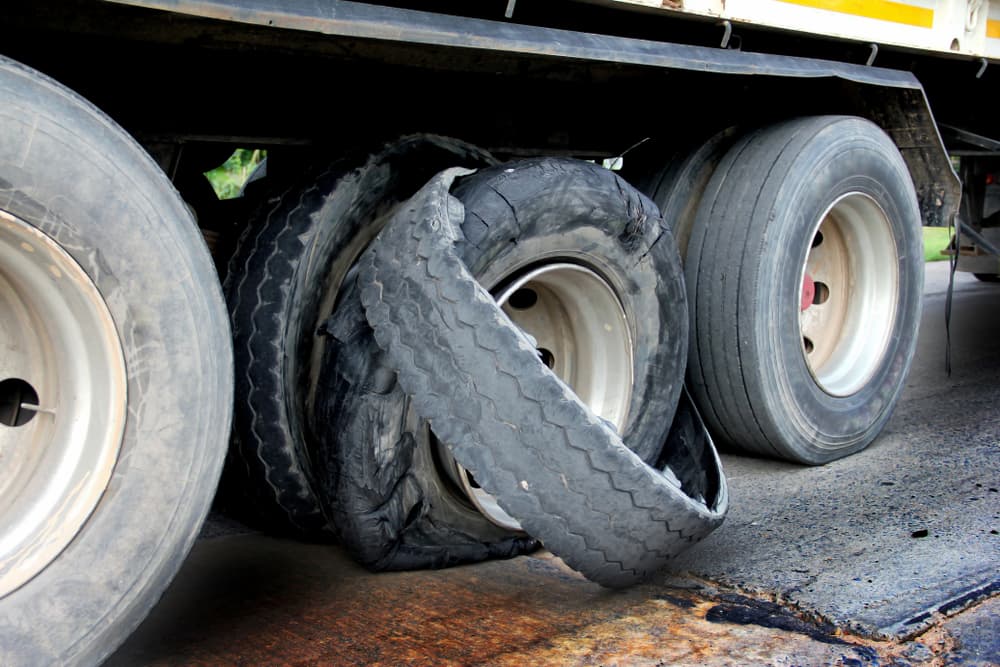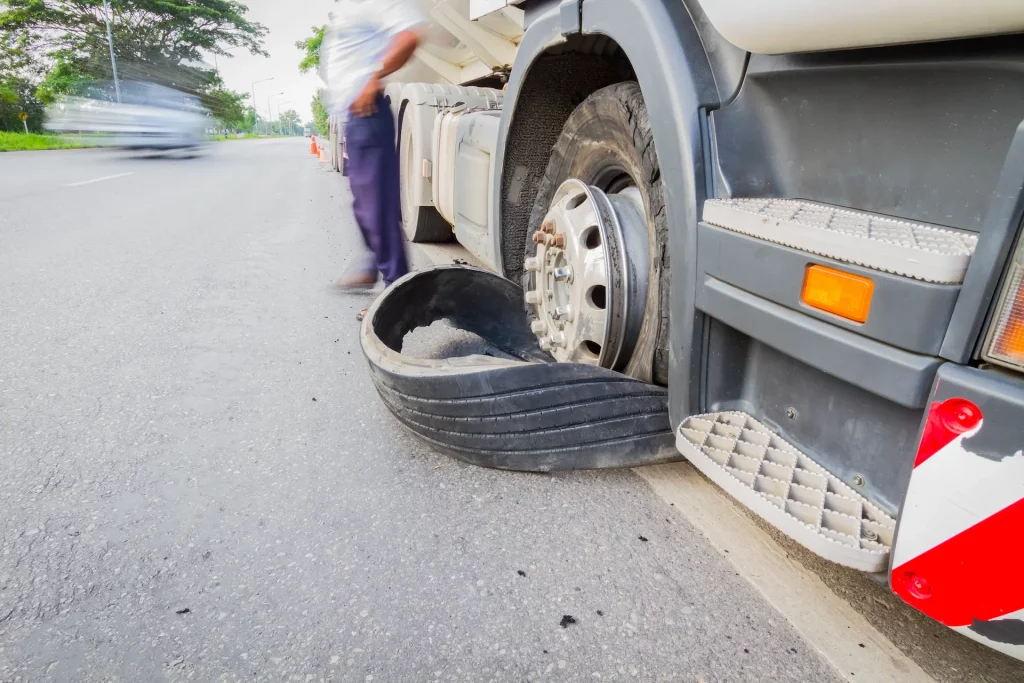Truck Tire Blowout Incident? You Need a Lawyer in Houston

The last place you want to be on the road is near a semi-truck when one of its tires blows out. A tire blowout can cause the truck driver to lose control of his vehicle and can be a factor in many severe injuries and fatal accidents across the U.S.
Unfortunately, truck tire blowouts occur frequently. According to the Federal Motor Carrier Safety Administration’s Large Truck and Bus Crash Facts report, tire issues are among the leading vehicle-related factors in fatal truck crashes.
Truck drivers are responsible for routinely checking their tires for worn treads, air pressure issues, and visible signs of defects. The trucking company, third-party mechanics, the tire manufacturer, and tire distributors all play a role in ensuring the tires on large trucks are free from hazardous defects. Negligence from any of these entities could lead to a disastrous truck incident.
Being severely injured in a truck accident can be devastating and potentially have lifelong consequences. If you have been hurt in a truck accident caused by a tire blowout, you shouldn’t have to pay out of your pocket for the resulting injuries, treatment, and other losses. You might be owed compensation for medical expenses, future medical costs, lost wages, pain and suffering, and more.
The Houston truck accident lawyers at The Callahan Law Firm are prepared to help you pursue the compensation you need and deserve. Contact us today for a 100% free and confidential case evaluation.
What’s the Difference Between a Tire Blowout and a Flat Tire?
One of the most notable differences is that a flat tire can often be repaired, whereas a tire blowout cannot. A flat tire results from a gradual loss of tire pressure which causes the tire to deflate, whereas a tire blowout happens when there is a sudden loss of tire pressure, often followed by an explosive sound. Blowouts are more dangerous than flat tires because a blowout affects the ability of the driver to handle the vehicle, which could lead to accidents.
Tire Blowout Risks and Driver Safety in the US
Nationally, “tire blowout season” runs from approximately the middle of May through early October. This is when temperatures rise and become the hottest in most areas of the U.S. That said, a truck tire blowout could happen any time of the year, so drivers must be vigilant when driving near trucks.
Tire blowouts can cause dangerous and deadly accidents, such as the one that happened in 2018 in New Mexico. A truck heading eastbound blew out the right front tire, which caused the truck to veer into the path of a westbound Greyhound bus. Eight people were killed, and several others were hospitalized.
According to the FMCSA, a tire blowout or flat tire is one of the leading causes of loss of control on commercial trucks. In one recent year in the U.S., loss of control was the cause of 11,000 property damage truck accidents, 4,000 injury truck crashes, and 203 fatal crashes. Tire issues were directly responsible for at least 67 fatal large crashes that year.
A driver should take specific actions following a blowout to regain control of the truck until they can bring the truck to a stop. When a driver doesn’t know how to maneuver the truck appropriately following a blowout, they pose a greater risk to all of the other drivers around them.
Who Is Liable in a Truck Tire Blowout Accident in Houston?

Multiple parties may be responsible for a truck tire blowout accident. These parties include:
- Truck drivers – Truck drivers are typically responsible for checking the tires on their vehicles for wear and tear, proper inflation, and visible signs of a defect before every trip. They could be liable for the truck accident if they fail to check their tires or ignore the obvious signs of a faulty tire. They could also be liable if they fail to react appropriately to a tire blowout or if their negligent actions, such as speeding or overloading, may have contributed to it.
- Trucking companies – Trucking companies are also responsible for maintaining their vehicles, including the tires. Suppose the trucking company ignored the mechanics’ recommendations to change the tires or encouraged the driver to continue driving despite possible tire issues. In that case, they may be held responsible for the accident. They may also be liable if they hire an unqualified truck driver or fail to train their drivers on tire safety protocols. The company could be liable for negligence if the driver were an employee.
- Truck mechanics – the mechanics who checked the tires for safety or who installed the tires may be responsible if they failed to fit the tire on the truck appropriately or if they missed signs of a faulty tire, such as worn treads, cracks, or bulges in the tire.
- Tire distributors – Trucking companies or truck owners normally buy tires from tire distributors. These distributors are responsible for ensuring the tires they sell meet safety requirements. They’re also responsible for properly storing the tires and helping customers get the right type of tires for their trucks.
- Tire manufacturers – The manufacturers of tires may be responsible for a blowout accident if their tires are defective due to the design, the materials used, or the manufacturing process.
How do Truck Tire Blowouts Happen?
Truck tire blowout accidents can happen in the blink of an eye and can result in serious accidents – even pile-ups – if the truck driver cannot maintain control of their vehicle. Some of the causes of truck blowout accidents include:
- Wear over time – Manufacturers rate tires for a set number of miles. If a driver or the trucking company exceeds the mileage limit or overlooks the extent of wear and tear, there is a higher potential for a blowout, tread separation, or loss of traction while driving.
- Manufacturing defects – Some common manufacturing defects include using outdated rubber, failing to develop an appropriate tread, incorporating too much moisture during the curing process, or allowing a foreign object to become embedded in the tire.
- Installation defects – Large trucks and semi-trucks must have their tires rotated consistently to maintain an even wear pattern. If the tires are not rotated, it can increase the risk of excessive wear and a blowout.
- Overloading – Trucks have weight restrictions based on the truck’s structure and the tires. An overloaded truck places undue stress on the tires, which can cause the weakest tire to blow out.
- Tread separation – This is a dangerous situation where the tread separates from the tire’s body. This can be caused by a manufacturer’s defect or general wear and tear. The driver should notice an abnormal vibration that indicates a bubble has formed just before the tire fails.
- Potholes – The truck’s suspension and tires should absorb shock from an impact on the road. Small potholes do not present a problem. However, if a truck hits a larger pothole at high speed, it can force the tread to separate and a blowout to occur.
- Underinflation – This means the tires are not properly inflated, which can cause abnormal wear on the side walls of the tires. The side walls are thinner than the tread and not meant to meet the road surface. This creates a weak spot that can blow out.
- Heat – During the summer, the pavement temperature can rise to well over 100 degrees, causing the tire pressure to increase to bursting levels.
- Road debris – Running over road debris can set the tire up for a blowout. This can be immediate, especially if the debris slices open the tire and the air releases immediately. It can occur over time, such as if the tire picks up a nail.
- Speeding – Speeding can result in greater tire friction, and a combination of friction and other issues can lead to a blowout.
Can You Minimize the Risk of a Tire Blowout?
As you have already seen, various factors can contribute to tire blowouts, and while you cannot always prepare for each eventuality, there are some steps you can take to prevent a tire blowout:
- Maintain proper tire pressure
- Check the tires regularly for wear and tear
- Replace worn tires
- Avoid overloading or speeding
- Drive carefully on rough roads
Although these tips may appear obvious, they are highly significant and can aid in preserving the durability of your tires. But what happens when, despite necessary precautions, you are involved in a truck tire blowout? Let’s take a closer look.
What to Do If You’ve Been Hurt in a Truck Tire Blowout Accident
After a Houston tire blowout truck crash, there are several steps you can take to uphold your rights and protect your health. These steps include:
- Seek prompt medical care. The injuries suffered in truck accidents are often severe and could be life-altering. Seeking immediate medical attention for your injuries will ultimately help your recovery.
- Contact an experienced truck accident attorney. Truck accidents are often major, complex events. A truck accident lawyer can help you navigate the steps you should take to protect your right to compensation. They’ll launch an immediate investigation into the cause of the accident before evidence gets destroyed, and they’ll handle communication with the trucking company’s insurance companies.
- Continue to follow your treatment plan. Follow your doctor’s orders, and attend all the appointments with your doctors, physical therapists, and other medical professionals. Doing so will protect your health and show you’re doing everything possible to recover.
- Gather documentation related to the accident. Collect medical records, medical bills, pay stubs, tax documents, photos and videos of the accident, and anything else that could help show the extent of your losses and your injuries.
- Avoid discussing the accident with others. Refrain from publicly talking about the accident or posting updates on social media, as your information could be twisted and used against you.
Contact Our Houston Truck Tire Blowout Accident Lawyer
At The Callahan Law Firm, we have over 25 years of experience helping accident victims seek justice after a truck accident. We have the experience and resources to handle even the most complex truck accident cases and provide the responsible and compassionate representation you need.
We will handle every detail of your case from start to finish, so you can focus on recovering from your injuries and moving forward with your life. Contact us for a FREE consultation to discuss your case in detail today.
FAQs
Q: What should I do when a tire blows out?
A: If you have a tire blowout, you should:
- Stay calm and keep your hands on the steering wheel
- Warn other drivers with your hazard lights
- Do not slam the brakes
- Ease off the gas pedal and let the vehicle slow down gradually
- Pull over at a safe place
- Once you’re off the road, apply the brakes gently and stop the vehicle
- Call for roadside assistance
Q: What causes tires to blowout?
A: Some of the causes of tire blowouts are:
- Low or high tire pressure
- Overloading the vehicle
- Road hazards
- Driving at high speeds
- Impact damage
- Punctures
Q: What is the definition of a tire blowout?
A: A tire blowout is a type of tire damage that usually happens during driving. The sudden and rapid loss of air pressure causes it.
Q: Can you feel a tire blowout?
A: Yes, you can feel a tire blowout as it occurs by:
- A disruption in the car’s normal movements
- A whooshing sound of the air escaping from the tire
- A loss of vehicle control and stability
- A vibration in the steering wheel or the vehicle
- A thumping or flapping sensation from the blown-out tire hitting the road











